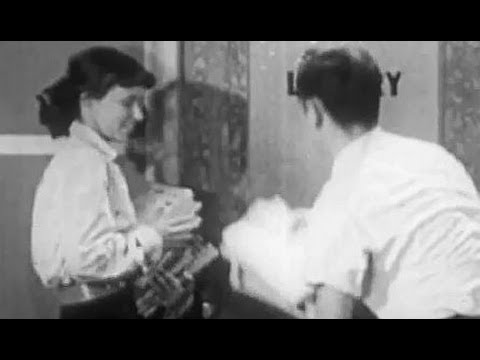more at
“How teenagers can cultivate good manners by manifesting a real desire to get along with others.”
NEW VERSION with improved video & sound:
Public domain film from the Library of Congress Prelinger Archive, slightly cropped to remove uneven edges, with the aspect ratio corrected, and mild video noise reduction applied.
The soundtrack was also processed with volume normalization, noise reduction, clipping reduction, and/or equalization (the resulting sound, though not perfect, is far less noisy than the original).
In sociology, manners are the unenforced standards of conduct which demonstrate that a person is proper, caring, non-grouchy, polite, and refined. They are like laws in that they codify or set a standard for human behavior, but they are unlike laws in that there is no formal system for punishing transgressions, the main informal “punishment” being social disapproval. They are a kind of norm. What is considered “mannerly” is highly susceptible to change with time, geographical location, social stratum, occasion, and other factors. That manners matter is evidenced by the fact that large books have been written on the subject, advice columns frequently deal with questions of mannerly behavior, and that schools have existed for the sole purpose of teaching manners. A lady is a term frequently used for a woman who follows proper manners; the term gentleman is used as a male counterpart; though these terms are also often used for members of a particular social class…
Etiquette (/ˈɛtɨkɛt/ or /ˈɛtɨkɪt/, French: [e.ti.kɛt]) is a code of behavior that delineates expectations for social behavior according to contemporary conventional norms within a society, social class, or group. The French word étiquette, literally signifying a tag or label first appeared in English around 1750…
Usage
In French, the word “etiquette” has been described as the one word that aptly describes life during the reign of Queen Victoria.
Rules of etiquette
Rules of etiquette encompass most aspects of social interaction in any society, though the term itself is not commonly used. A rule of etiquette may reflect an underlying ethical code, or it may reflect a person’s fashion or status. Rules of etiquette are usually unwritten, but aspects of etiquette have been codified from time to time.
Manners
Manners involve a wide range of social interactions within cultural norms as in the “comedy of manners”, or a painter’s characteristic “manner”. Etiquette and manners, like mythology, have buried histories especially when they seem to have little obvious purpose, and their justifications as logical (“respect shown to others” etc.) may be equally revealing to the social historian.
Western office and business etiquette
The etiquette of business is the set of written and unwritten rules of conduct that make social interactions run more smoothly. Office etiquette in particular applies to coworker interaction, excluding interactions with external contacts such as customers and suppliers. When conducting group meetings in the United States, the assembly might follow Robert’s Rules of Order, if there are no other company policies to control a meeting.
These rules are often echoed throughout an industry or economy. For instance, 49% of employers surveyed in 2005 by the American National Association of Colleges and Employers found that non-traditional attire would be a “strong influence” on their opinion of a potential job candidate.
Both office and business etiquette overlap considerably with basic tenets of netiquette, the social conventions for using computer networks.
Business etiquette can vary significantly in different countries, which is invariably related to their culture. For example: A notable difference between Chinese and Western business etiquette is conflict handling. Chinese businesses prefer to look upon relationship management to avoid conflicts – stemmed from a culture that heavily relies on Guanxi. While the west leaves resolution of conflict to the interpretations of law through contracts and lawyers.
Adjusting to foreign etiquettes is a major complement of culture shock, providing a market for manuals. Other resources include business and diplomacy institutions, available only in certain countries such as the UK.
In 2011, a group of etiquette experts and international business group formed a non-profit organization called IITTI (pronounced as “ET”) to help human resource (HR) departments of multinationals in measuring the etiquette skills of prospective new employees during the recruitment process by standardizing image and etiquette examination, similar to what ISO does for industrial process measurements…

